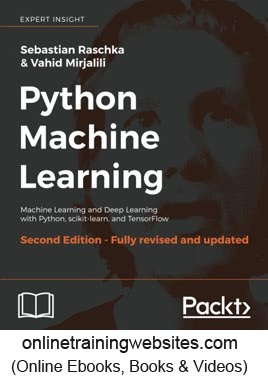Key Features
* Second edition of the bestselling book on Machine Learning
* A practical approach to key frameworks in data science, machine learning, and deep learning
* Use the most powerful Python libraries to implement machine learning and deep learning
* Get to know the best practices to improve and optimize your machine learning systems and algorithms
Book Description
Machine learning is eating the software world, and now deep learning is extending machine learning. Understand and work at the cutting edge of machine learning, neural networks, and deep learning with this second edition of Sebastian Raschka's bestselling book, Python Machine Learning. Thoroughly updated using the latest Python open source libraries, this book offers the practical knowledge and techniques you need to create and contribute to machine learning, deep learning, and modern data analysis.
Fully extended and modernized, Python Machine Learning Second Edition now includes the popular TensorFlow deep learning library. The scikit-learn code has also been fully updated to include recent improvements and additions to this versatile machine learning library.
Sebastian Raschka and Vahid Mirjalili's unique insight and expertise introduce you to machine learning and deep learning algorithms from scratch, and show you how to apply them to practical industry challenges using realistic and interesting examples. By the end of the book, you'll be ready to meet the new data analysis opportunities in today's world.
If you've read the first edition of this book, you'll be delighted to find a new balance of classical ideas and modern insights into machine learning. Every chapter has been critically updated, and there are new chapters on key technologies. You'll be able to learn and work with TensorFlow more deeply than ever before, and get essential coverage of the Keras neural network library, along with the most recent updates to scikit-learn.
What you will learn
- Understand the key frameworks in data science, machine learning, and deep learning
- Harness the power of the latest Python open source libraries in machine learning
- Explore machine learning techniques using challenging real-world data
- Master deep neural network implementation using the TensorFlow library
- Learn the mechanics of classification algorithms to implement the best tool for the job
- Predict continuous target outcomes using regression analysis
- Uncover hidden patterns and structures in data with clustering
- Delve deeper into textual and social media data using sentiment analysis
Table of Contents
* Giving Computers the Ability to Learn from Data
* Training Simple Machine Learning Algorithms for Classification
* A Tour of Machine Learning Classifiers Using Scikit-Learn
* Building Good Training Sets - Data Preprocessing
* Compressing Data via Dimensionality Reduction
* Learning Best Practices for Model Evaluation and Hyperparameter Tuning
* Combining Different Models for Ensemble Learning
* Applying Machine Learning to Sentiment Analysis
* Embedding a Machine Learning Model into a Web Application
* Predicting Continuous Target Variables with Regression Analysis
* Working with Unlabeled Data - Clustering Analysis
* Implementing a Multilayer Artificial Neural Network from Scratch
* Parallelizing Neural Network Training with TensorFlow
* Going Deeper - The Mechanics of TensorFlow
* Classifying Images with Deep Convolutional Neural Networks
* Modeling Sequential Data using Recurrent Neural Networks
Published on: 2017-09-20
Released on: 2017-09-20
Original language: English
Number of items: 1
Dimensions: 9.25" h x 1.41" w x 7.50" l,
Binding: Paperback
622 pages
About the Author
Sebastian Raschka, author of the bestselling book, Python Machine Learning, has many years of experience with coding in Python, and he has given several seminars on the practical applications of data science, machine learning, and deep learning, including a machine learning tutorial at SciPy - the leading conference for scientific computing in Python.
While Sebastian's academic research projects are mainly centered around problem-solving in computational biology, he loves to write and talk about data science, machine learning, and Python in general, and he is motivated to help people develop data-driven solutions without necessarily requiring a machine learning background.
His work and contributions have recently been recognized by the departmental outstanding graduate student award 2016-2017, as well as the ACM Computing Reviews' Best of 2016 award. In his free time, Sebastian loves to contribute to open source projects, and the methods that he has implemented are now successfully used in machine learning competitions, such as Kaggle.
Vahid Mirjalili obtained his PhD in mechanical engineering working on novel methods for large-scale, computational simulations of molecular structures. Currently, he is focusing his research efforts on applications of machine learning in various computer vision projects at the Department of Computer Science and Engineering at Michigan State University.
Vahid picked Python as his number-one choice of programming language, and throughout his academic and research career he has gained tremendous experience with coding in Python. He taught Python programming to the engineering class at Michigan State University, which gave him a chance to help students understand different data structures and develop efficient code in Python.
While Vahid's broad research interests focus on deep learning and computer vision applications, he is especially interested in leveraging deep learning techniques to extend privacy in biometric data such as face images so that information is not revealed beyond what users intend to reveal. Furthermore, he also collaborates with a team of engineers working on self-driving cars, where he designs neural network models for the fusion of multispectral images for pedestrian detection.

No comments:
Post a Comment